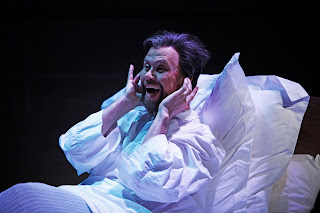'Chekhov in Hell' review or 'What did I miss?'
'Chekhov in Hell', Dan Rebellato
Soho Theatre, Wednesday 27th April
Written for Culture Wars
 |
| Simon Gregor as Chekhov. Photo Credit: Nobby Clark |
While you were sleeping for a hundred years, Chekhov, a whole lot happened. Firstly, you somehow ended up in England. Secondly, there seems to be a different language for every situation, this thing called the internet is ubiquitous, everyone is dressed very strangely indeed and people bloody well date to a timer. What about romance? What about real communication? What about substance? This is the world that Chekhov discovers when he awakes from a coma in Dan Rebellato's 'Chekhov in Hell'.
Other than the title, Rebellato's play isn't all that interested in Chekhov. What Chekhov (Simon Gregor) is, however, is a suitably curious observer. His blinking eyes, as he miraculously escapes from hospital, allows us to view entrenched, contemporary customs anew. The very fact of his escape affords a quick dig at the NHS, 'We let the oldest man in the world walk out of this hospital!' And, as soon as he is outdoors, Chekhov's penchant for people attracts cynical suspicion. He is accused of paedophilia and, when a random Russian chap saves him, this infamous (yet somehow strangely anonymous) playwright is on the run. And with this, Rebellato has free reign to satirise contemporary customs at will.
 |
| Chekhov tries to blend in |
Perhaps it's slightly generous to call this a satire. What 'Chekhov in Hell' really is, is a series of brilliantly conceived comic sketches. They are hugely enjoyable and contain some scathing observations but they aren't anchored closely enough to reality to really touch a nerve. But they sure do hit the funny bone.
A small cast is required to play a litany of modern day 'types' and, with little need to hold back, they perform with abandoned gusto. So, the doctor who lets Chekhov escape is laughably self-serving and deeply incompetent. The Russian Mafiosi that Chekhov unwittingly befriends is all the evil James Bond baddies combined. The designer that unfolds the mysteries of fashion to Chekhov is super gay, super cynical and brilliantly offensive; 'Fashion is our way of reminding ourselves that women are deep down stupid.'
 |
| Chekhov's wife visits, via the Northern Lights |
The one scene these techni-coloured characters feel overdone – and, perhaps, even slightly irresponsible – is when a white actress (Ruth Everett) plays a black popstar. For some reason, it feels OK to lampoon the blankly beaming support group leader or the empty babbles of a TV producer but, when Ruth Everett tries to 'keep it real' as a black starlet, waving her hands, jutting her hips and babbling impenetrable banalities, it feels a little wrong; a little insensitive and even a little cheap.
The other jarring moment, amidst the stream of one liners and skilfully amplified scenarios, is when the characters start to repeat themselves. The episodic nature of this piece means that, on the whole, Rebellato can wring his juicy sketches dry, before casting them aside. However, when he recalls the Support Caller, the funniest character in this play ('Crime is also about here...I'm pointing to my heart, Nicola!'), the laughs eventually dry up. It is through less successful repetition that one begins to realise the limits of this sparkly piece.
So, whilst this piece is brilliantly amusing – light, buzzing, clever and assured – the gags have a fairly short shelf life. I'm always slightly suspicious of episodic plays, in which each episode could not hope to stand alone. Still, meshed together and bought to life by a clearly liberated cast, 'Chekhov in Hell' makes for some heavenly escapism.


Comments
Post a Comment